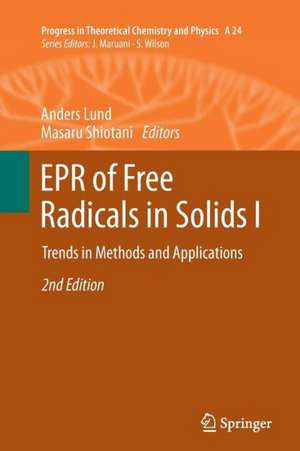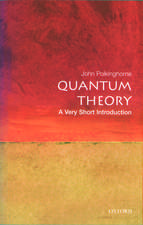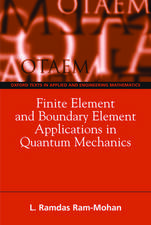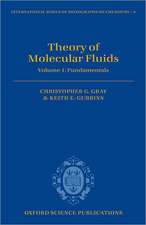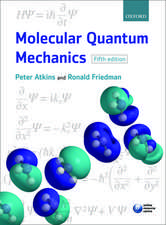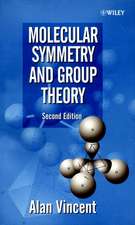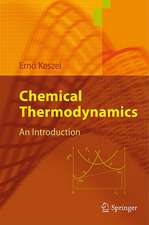EPR of Free Radicals in Solids I: Trends in Methods and Applications: Progress in Theoretical Chemistry and Physics, cartea 24
Editat de Anders Lund, Masaru Shiotanien Limba Engleză Paperback – 14 dec 2014
EPR of Free Radicals in Solids I focuses on the trends in experimental and theoretical methods to extract structural and dynamical properties of radicals and spin probes in solid matrices by continuous wave (CW) and pulsed techniques. It presents simulation techniques and software for CW and pulsed EPR as well as studies of quantum effects at low temperature. The chapters dealing with quantum chemistry methods for the theoretical interpretation of hyperfine coupling tensors and g-tensors have been much extended in this edition and a new chapter on the calculation of zero-field splitting tensors has been added. This new edition is a valuable resource to experimentalists and theoreticians in research involving free radicals, as well as for students of advanced courses in physical chemistry, chemical physics, materials science, biophysics, biochemistry and related fields.
This new edition is a valuable resource to experimentalists and theoreticians in research involving free radicals, as well as for students of advanced courses in physical chemistry, chemical physics, materials science, biophysics, biochemistry and related fields.
| Toate formatele și edițiile | Preț | Express |
|---|---|---|
| Paperback (1) | 1822.14 lei 6-8 săpt. | |
| SPRINGER NETHERLANDS – 14 dec 2014 | 1822.14 lei 6-8 săpt. | |
| Hardback (1) | 1832.85 lei 6-8 săpt. | |
| SPRINGER NETHERLANDS – 28 noi 2012 | 1832.85 lei 6-8 săpt. |
Din seria Progress in Theoretical Chemistry and Physics
-
 Preț: 391.79 lei
Preț: 391.79 lei - 18%
 Preț: 1238.74 lei
Preț: 1238.74 lei - 18%
 Preț: 1234.77 lei
Preț: 1234.77 lei - 18%
 Preț: 1236.51 lei
Preț: 1236.51 lei - 18%
 Preț: 1222.62 lei
Preț: 1222.62 lei - 18%
 Preț: 1230.53 lei
Preț: 1230.53 lei - 18%
 Preț: 945.30 lei
Preț: 945.30 lei - 18%
 Preț: 3023.14 lei
Preț: 3023.14 lei - 18%
 Preț: 1231.16 lei
Preț: 1231.16 lei - 15%
 Preț: 697.15 lei
Preț: 697.15 lei - 18%
 Preț: 956.69 lei
Preț: 956.69 lei - 18%
 Preț: 1214.90 lei
Preț: 1214.90 lei - 18%
 Preț: 1233.52 lei
Preț: 1233.52 lei - 18%
 Preț: 1224.99 lei
Preț: 1224.99 lei - 18%
 Preț: 1548.56 lei
Preț: 1548.56 lei - 18%
 Preț: 1845.48 lei
Preț: 1845.48 lei - 18%
 Preț: 1233.06 lei
Preț: 1233.06 lei - 18%
 Preț: 955.56 lei
Preț: 955.56 lei - 18%
 Preț: 1223.74 lei
Preț: 1223.74 lei - 24%
 Preț: 1069.41 lei
Preț: 1069.41 lei - 18%
 Preț: 956.69 lei
Preț: 956.69 lei - 18%
 Preț: 953.52 lei
Preț: 953.52 lei - 18%
 Preț: 954.45 lei
Preț: 954.45 lei - 18%
 Preț: 1223.74 lei
Preț: 1223.74 lei -
 Preț: 390.63 lei
Preț: 390.63 lei -
 Preț: 390.25 lei
Preț: 390.25 lei
Preț: 1822.14 lei
Preț vechi: 2222.12 lei
-18% Nou
Puncte Express: 2733
Preț estimativ în valută:
348.71€ • 359.75$ • 295.13£
348.71€ • 359.75$ • 295.13£
Carte tipărită la comandă
Livrare economică 04-18 martie
Preluare comenzi: 021 569.72.76
Specificații
ISBN-13: 9789401785273
ISBN-10: 9401785279
Pagini: 428
Ilustrații: XIV, 414 p. With 1st ed. published as one single volume; 2nd ed. in 2 volumes (available separately).
Dimensiuni: 155 x 235 x 22 mm
Greutate: 0.6 kg
Ediția:2nd ed. 2013
Editura: SPRINGER NETHERLANDS
Colecția Springer
Seria Progress in Theoretical Chemistry and Physics
Locul publicării:Dordrecht, Netherlands
ISBN-10: 9401785279
Pagini: 428
Ilustrații: XIV, 414 p. With 1st ed. published as one single volume; 2nd ed. in 2 volumes (available separately).
Dimensiuni: 155 x 235 x 22 mm
Greutate: 0.6 kg
Ediția:2nd ed. 2013
Editura: SPRINGER NETHERLANDS
Colecția Springer
Seria Progress in Theoretical Chemistry and Physics
Locul publicării:Dordrecht, Netherlands
Public țintă
ResearchCuprins
Continuous Wave EPR of Radicals in Solids (Anders Lund and Wei Liu).- Pulse EPR of Paramagnetic Centers in Solid Phases (Marina Brustolon and Antonio Barbon).- Dynamical Effects in CW and Pulsed EPR.- Deuterium Labeling Studies and Quantum Effects of Radicals in Solids (Nikolas- Ploutarch Benetis, Yurij Dmitriev).- XSophe - Sophe - XeprView and Molecular Sophe: Computer Simulation Software (Masaru Shiotani and Kenji Komaguchi).- Suites for the Analysis of Continuous Wave and Pulsed EPR and ENDOR Spectra (Graeme R. Hanson, Christopher J. Noble, Simon Benson).- The Calculation of the Hyperfine Coupling Tensors of Biological Radicals (Fuqiang Ban, James W. Gauld, Stacey D. Wetmore and Russell J. Boyd).- Ab initio and Density Functional Calculations of Electronic g-Tensors for Organic Radicals (Martin Kaupp).- Quantum Chemical Calculations of the Zero-Field Splitting Tensors for Organic Spin Multiplets (Kenji Sugisaki, Kazuo Toyota, Kazunobu Sato, Daisuke Shiomi, Masahiro Kitagawa and Takeji Takui).
Textul de pe ultima copertă
EPR of Free Radicals in Solids: Trends in Methods and Applications, 2nd ed. presents a critical two volume review of the methods and applications of EPR (ESR) for the study of free radical processes and structures in solids. Emphasis is on the progress made in the developments in EPR technology, in the application of sophisticated matrix isolation techniques and in the advancement in quantitative EPR that have occurred since the 1st edition was published. Improvements have been made also at the theoretical level, with the development of methods based on first-principles methods and their application to the calculation of magnetic parameters and to simulation of spectral shapes.
Written by international leading experts in the field, EPR of Free Radicals in Solids I focuses on the trends in experimental and theoretical methods to extract structural and dynamical properties of radicals and spin probes in solid matrices by continuous wave (CW) and pulsed techniques. It presents simulation techniques and computer software for CW and pulsed EPR signals, and also studies quantum effects at low temperature. In this edition, the chapters dealing with quantum chemistry methods for the theoretical interpretation of hyperfine coupling tensors and g-tensors have been much extended and a new chapter on the calculation of zero-field splitting tensors has been added.
This new edition is a valuable resource to both theoreticians and experimentalists active in research involving free radicals, as well as to students of advanced courses in physical chemistry, chemical physics, materials science, biophysics, biochemistry, and related fields.
Writtenby international leading experts in the field, EPR of Free Radicals in Solids I focuses on the trends in experimental and theoretical methods to extract structural and dynamical properties of radicals and spin probes in solid matrices by continuous wave (CW) and pulsed techniques. It presents simulation techniques and computer software for CW and pulsed EPR signals, and also studies quantum effects at low temperature. In this edition, the chapters dealing with quantum chemistry methods for the theoretical interpretation of hyperfine coupling tensors and g-tensors have been much extended and a new chapter on the calculation of zero-field splitting tensors has been added.
This new edition is a valuable resource to both theoreticians and experimentalists active in research involving free radicals, as well as to students of advanced courses in physical chemistry, chemical physics, materials science, biophysics, biochemistry, and related fields.
Written by international leading experts in the field, EPR of Free Radicals in Solids I focuses on the trends in experimental and theoretical methods to extract structural and dynamical properties of radicals and spin probes in solid matrices by continuous wave (CW) and pulsed techniques. It presents simulation techniques and computer software for CW and pulsed EPR signals, and also studies quantum effects at low temperature. In this edition, the chapters dealing with quantum chemistry methods for the theoretical interpretation of hyperfine coupling tensors and g-tensors have been much extended and a new chapter on the calculation of zero-field splitting tensors has been added.
This new edition is a valuable resource to both theoreticians and experimentalists active in research involving free radicals, as well as to students of advanced courses in physical chemistry, chemical physics, materials science, biophysics, biochemistry, and related fields.
Writtenby international leading experts in the field, EPR of Free Radicals in Solids I focuses on the trends in experimental and theoretical methods to extract structural and dynamical properties of radicals and spin probes in solid matrices by continuous wave (CW) and pulsed techniques. It presents simulation techniques and computer software for CW and pulsed EPR signals, and also studies quantum effects at low temperature. In this edition, the chapters dealing with quantum chemistry methods for the theoretical interpretation of hyperfine coupling tensors and g-tensors have been much extended and a new chapter on the calculation of zero-field splitting tensors has been added.
This new edition is a valuable resource to both theoreticians and experimentalists active in research involving free radicals, as well as to students of advanced courses in physical chemistry, chemical physics, materials science, biophysics, biochemistry, and related fields.
Caracteristici
Focuses on applications involving inorganic and organic radicals High-spin molecules and complexes are also considered as well as radical processes in photosynthesis 2nd edition includes recent advances in environmental applications including EPR dosimetry
